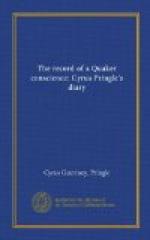The relaxation of my nerves and muscles after having been so tensely strained left me that afternoon so weak that I could hardly walk or perform any mental exertion.
I had not yet eaten the mean and scanty breakfast I had prepared, when I was ordered to pack up my things and report myself at the lieutenant’s tent. I was accustomed to such orders and complied, little moved.
The lieutenant received me politely with, “Good-morning, Mr. Pringle,” and desiring me to be seated, proceeded with the writing with which he was engaged. I sat down in some wonderment and sought to be quiet and prepared for any event.
“You are ordered to report to Washington,” said he; “I do not know what it is for.” I assured him that neither did I know. We were gathered before the Major’s tent for preparation for departure. The regimental officers were there manifesting surprise and chagrin; for they could not but show both as they looked upon us, whom the day before they were threatening to crush into submission, and attempting also to execute their threats that morning, standing out of their power and under orders from one superior to their Major Commanding E.M. As the bird uncaged, so were our hearts that morning. Short and uncertain at first were the flights of Hope. As the slave many times before us, leaving his yoke behind him, turned from the plantations of Virginia and set his face toward the far North, so we from out a grasp as close and as abundant in suffering and severity, and from without the line of bayonets that had so many weeks surrounded us, turned our backs upon the camp of the 4th Vermont and took our way over the turnpike that ran through the tented fields of Culpeper.
At the War Office we were soon admitted to an audience with the Adjutant General, Colonel Townsend, whom we found to be a very fine man, mild and kind. He referred our cases to the Secretary of War, Stanton, by whom we were ordered to report for service to Surgeon General Hammond. Here we met Isaac Newton, Commissioner of Agriculture, waiting for our arrival, and James Austin of Nantucket, expecting his son, Charles L. Austin, and Edward W. Holway of Sandwich, Mass., conscripted Friends like ourselves, and ordered here from the 22nd Massachusetts.
We understand it is through the influence of Isaac Newton that Friends have been able to approach the heads of Government in our behalf and to prevail with them to so great an extent. He explained to us the circumstance in which we are placed. That the Secretary of War and President sympathized with Friends in their present suffering, and would grant them full release, but that they felt themselves bound by their oaths that they would execute the laws, to carry out to its full extent the Conscription Act. That there appeared but one door of relief open,—that was to parole us and allow us to go home, but subject to their call again ostensibly, though this they neither wished nor proposed to do. That the fact of Friends




